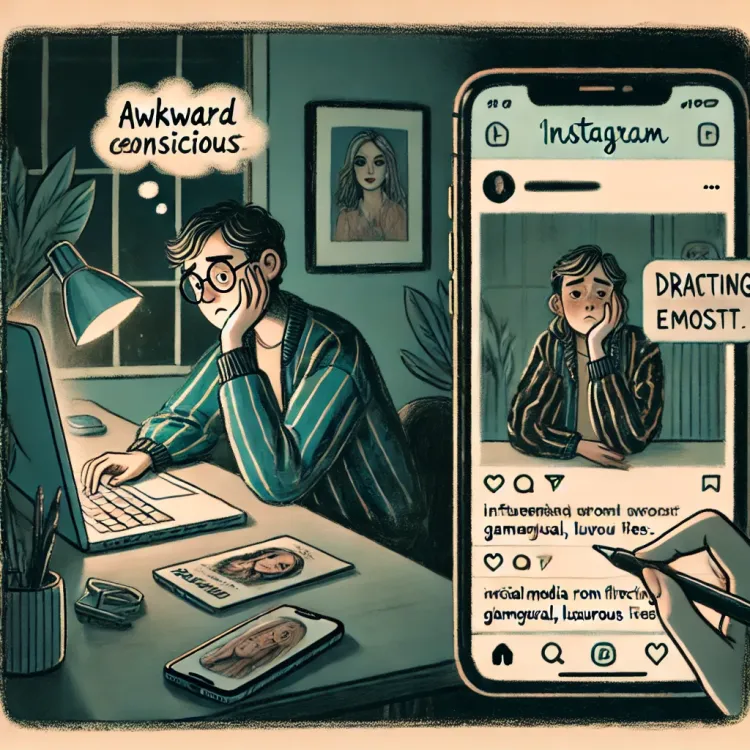Why do people think I’m weird? It’s a question that crosses many minds at some point. You may have had thoughts like these:
Imagine being in public and constantly fixing your appearance, always checking your reflection, worried that something might look “off” and catch people’s attention. If someone stares a bit too long, you feel a wave of embarrassment, wondering if there’s a stain on your shirt or something odd about your look.

Or maybe, in an important meeting, you accidentally say something awkward. At home later, you replay the moment, cringing, dreading that others will gossip about your slip-up. That feeling of “curling your toes in embarrassment” lingers through the night.
And then there’s social media. Scrolling late at night, you see influencers and friends flaunting seemingly perfect, luxurious lives, free from worry. This triggers appearance anxiety, career anxiety—even self-worth anxiety. You wonder, “Am I doing enough? Am I weird for feeling like I don’t measure up?” You might even draft a Facebook post, delete it, then rewrite it, worried others will judge you.
These thoughts are more common than they may seem. In fact, you might be experiencing the “Spotlight Effect.”

What is the Spotlight Effect?
The “Spotlight Effect” is a term in social psychology describing how people tend to overestimate how much others notice and scrutinize them. Psychologists Thomas Gilovich and Kenneth Savitsky coined this concept, which affects all age groups, though young people may be especially vulnerable.
When something embarrassing or awkward happens, this effect can amplify, making you feel like all eyes are on you, even if others barely noticed. Recognizing this effect is the first step to overcoming the anxiety it can bring.

Why Are We So Focused on Others’ Opinions?
Ironically, being overly concerned with what others think is actually a form of self-centeredness. It may sound strange, but the fear of others’ judgments is really about protecting the idealized version of yourself you imagine they hold. In worrying about how others see you, you’re really wrestling with your own insecurities.
And often, we unintentionally project our own judgments onto others. This creates a cycle where we place ourselves under an imaginary microscope, fearing judgment from people who likely aren’t paying much attention at all.
If you’re ready to stop letting the “Spotlight Effect” control your life, here are three effective strategies to get started:

1. Shift Your Focus to Others: Give and Connect
The first step to overcoming self-centered anxiety is to stop fixating on yourself. Instead, direct your attention outward by genuinely caring about others.
Take notice of the people who love and support you. Show gratitude for a family member who made you dinner or reconnect with an old friend. Volunteering is another great way to gain perspective by helping those in need.
By engaging in positive interactions, you’ll cultivate a sense of belonging and find more joy in authentic connections, which ultimately builds self-confidence and happiness.
2. Stop Playing the “Victim” Role
Stop being a victim! Life isn’t always fair, and setbacks happen. Those who see themselves as victims often blame others for challenges or setbacks, reinforcing a sense of helplessness.
This mindset traps you in a loop where your personal growth is stalled. Instead, aim to take responsibility for your life. Healthy relationships are built on equality, where criticism and feedback can be shared openly without needing to feel victimized.
Accepting that setbacks are a part of life can make you more resilient, allowing you to approach future challenges with a renewed strength and a balanced view.
3. Let Go of Perfectionism: Embrace Your Unique Self
Recognize this reality: You don’t need to be perfect, nor do you need everyone to like you. Perfectionism can stem from a need for external validation, which is exhausting and ultimately impossible to sustain.
A healthier approach is to derive a sense of self-worth from within. Focus on qualities that make you uniquely you:
- “I have a healthy body that enables me to pursue my dreams and goals.”
- “I’m insightful and think deeply about issues, which helps me avoid following the crowd.”
- “Yesterday, I fed a stray cat, showing my compassion and kindness.”

In the end, don’t be afraid of being disliked or judged. Be confident in who you are and let go of needing others’ approval to feel valuable.
Embrace the freedom of being yourself—without fear or hesitation!
References:
- Spotlight Effect
- Berkeley Scientific Journal: This article explains the spotlight effect and provides an example of a study conducted at Cornell University. Participants wearing an embarrassing shirt overestimated how many people noticed it, demonstrating the spotlight effect1.
- Self-Centeredness
- PISA 2022 Results (Volume V): This report from the OECD discusses students’ readiness for self-directed learning and highlights the importance of self-beliefs and motivation, which are related to self-centeredness2.
- Psychological Bulletin: A meta-analytic review of correlates of the self in childhood and adolescence, showing how self-beliefs affect behavior and outcomes3.
- Appearance Anxiety
- Current Psychology: A study on the contribution of social media addiction to social appearance anxiety among adolescents, showing how social media influences appearance anxiety4.
- Journal of Basic and Applied Scientific Research: This study investigates the relationship between self-esteem and social appearance anxiety in secondary school students5.
- Career Anxiety
- Harvard Business Review: An article discussing how anxiety can interfere with work and providing advice on managing symptoms6.
- University of Michigan: Research showing record levels of anxiety and depression among college students, which can impact their career readiness7.
- Self-Worth Anxiety
- Current Psychology: A study examining the predictive role of self-esteem in the interaction between anxiety and academic self-efficacy among Chinese university students8.
- University of Michigan: Another report highlighting the high levels of anxiety and depression among college students and their efforts to seek help9.
- Perfectionism
- Participatory Educational Research: A qualitative study on self-identified perfectionists and procrastinators, exploring the motives behind perfectionism and its impact on academic tasks10.
- Learning and Individual Differences: A study assessing perfectionism in children and adolescents, providing insights into the expression of perfectionism11.
Disclaimer:
The information in this article is for general information sharing purposes only. It is not a substitute for personalized medical or dietary advice. For personal health concerns and dietary needs, consult a qualified health care provider or dietitian.

